Fasting in the month of Ramadan is the third pillar of Islam. Muslims all over the world are obligated to fast by the commandment of Allah in the Holy Quran (2: 185), “The month of Ramadan is that in which was revealed the Quran, a guidance for the people and clear proofs of guidance and criterion. So, whoever sights the crescent of the month, let him fast it; and whoever is ill or on a journey- then an equal number of other days later. Allah intends for you ease and does not intend for you hardship and wants for you to complete the period to glorify Allah for that to which He has guided you; and perhaps you will be grateful”
The Muslim Health Workers Association of Ghana (MHWAG) is a faith based, non-profit organization which has members across the country, embarked on their maiden pre-Ramadan health conference and screening exercise to embrace the month and sensitize Muslims on optimizing the Ramadan fast to gain both the spiritual and health benefits. The conference was organized on the April 20, 2019 at the Islamic Education Unit, Auditorium in Kumasi, whilst the health screening was done on April 27, 2019 at Konongo Zongo Community. In attendance were representatives from the office of the Asokore Mampong Municipal Chief Executive, Council of Ulamau- Ashanti, Federation of Muslim Women Organization Ghana, Ghana Islamic Education Unit, Gurunshie and Sisala Chief of Ashanti and His Delegates, Ghana Muslim Students Association and members of the general public. The conference was chaired by the Dr Duah Mohammed, ENT consultant at the Komfo Anokye Teaching Hospital (KATH)
The speakers were the eminent Islamic Scholar, Sheikh Ishaq Nuamah who highlighted the spiritual benefits of fasting included the development of improved worship and glorification of Allah, self restraints and fear of Allah. The month of good deeds whose practices are expected to go beyond the prescribed period when undertaken according the correct rules of fasting. Dr. Nazir Mohammed Tanko, gave a presentation on fasting and medical conditions. He looked at the effects of Ramadan fasting on health parameters of a normal individual, it effects on selected diseases and management considerations. He explained that Ramadan may be likened to annual alternate day fasting that is characterized by periods fasting and feasting separated by a 12 to 18 hours interval. During the fasting period the individual refrain from eating, drinking, smoking, sexual intercourse and medicating from sunrise to sunset. He reported that there are changes in fluid and energy balance and some hematological parameters. He emphasized that all Muslims who had any chronic illness should discuss with their healthcare providers before commencing the fast. He made certain generalizations based on literature about certain common medical conditions. Individual with well controlled hypertension, well controlled type 2 diabetes mellitus, stable coronary artery disease and uncomplicated sickle cell disease were safe to fast. Whilst it was unsafe to fast in patients with type 1 diabetes mellitus, moderate to severe chronic kidney disease, frequently complicated sickle cell disease and sever hypertension. Patients with diagnosed peptic ulcer disease should refrain from fasting to prevent dangerous consequences such as perforation of the stomach or intestines. Sickle cell disease patient must hydrate appropriately at start and breaking of fast to prevent dehydration which may precipitate bone crises. The third speaker a licensed dietitian, Mrs Habiba Yusuf gave dietary counseling for the fasting individual. She added that, all those who are ill or frail, pregnant or menstruating women, breastfeeding mothers and travellers are exempted per the sayings of the prophet Mohammed (SAW). Ramadan helps us to further enhance a balanced and
healthy lifestyle by ensuring that we give our stomach a halt which by so doing enables our bodies to breakdown and expel accumulated toxins. Having a healthy balanced meal (suhoor/iftaar) is therefore very important as they are the meals that replenishes and sustains energy levels during the fast. Ensuring u have a healthy balanced meal in this holy month, these 4 healthy eating guidelines should be considered.
- Rule of timing
- Rule of balance
- Rule of quantity
- Rule of variety
Rule of timing
Suhoor and iftaar should be taken at the right times i.e. Suhoor should not be taken too early equally iftaar not too late. Suhoor: 3:00-4:30am, Iftaar: 6:15 pm -9:00pm
Rule of balance
A balanced diet is one that contains all the food nutrients in their right quantities. This meal should cover the three core food groups, the balance on your plate is a quarter protein, a quarter carbohydrate and half vegetables.
Rule of quantity
Ramadan is not a feasting time as presumed in our various homes, people tend to eat so much that they are unable to get this full healthy benefit of the holy month. Remember moderation is always the key as the Islamic etiquettes of eating prohibits overfeeding and promotes moderation of food intake
Rule of variety
Eating a varied, well-balanced diet means eating a variety of foods from the various food groups daily in their recommended amounts. The secret is to make your plate or food colorful enriched with variety foods. Your plate can have rice with a bowl of salad made with variety of vegetables and eggs.
Hydration tips
Keep yourself hydrated during fasting is very important. The recommended fluid intake a day is 3 litres, this could be incorporated in our water intake, juices, soups and some vegetables that help in hydrating our bodies.
Ramadan tips
- Don’t skip suhoor as it’s the most important meal for your fast
- Don’t overeat iftaar, it should be a well-balanced meal not a feast. Overeating may result to indigestion and weight gain.
- Avoid eating fried foods, salty foods and sugary foods, whiles they make you feel good they make fasting the following day very difficult.
- Avoid drinking caffeine, as it’s a diuretic and tends to make you dehydrated.
- Drink as much water as possible in the form of water, juices and soups to help you be hydrated.
- Consume more complex carbohydrates as they tend to release energy slowly during the day.

The following week the Association interacted with members of the Konongo Zongo community, a brief education on health benefits of Ramadan, precautions prior to Ramadan fasting and dietary counselling for the month of Ramadan was also delivered. A total of 200 children and adults, Muslims and Christians were attended. Screening activities targeted blood pressure, random glucose measurements, hepatitis B virus. There were general consultation services by attending doctors and nutritionists. Medications were prescribed and administered at the grounds.
The aim of the Association is to remodel our communities through Health and Islam through education, advocacy, community awareness and empowerment. The association believes that this exercise when sustained will engender a healthy approach to the Ramadan fast and increase the health benefits. It will also reduce the discomforts of the fast in healthy adults. This activity will also encourage chronic stable patients to have a discussion with their care givers before undertaking the fast. This may enable patients take the right decisions that will reduce any negative effects of Ramadan fasting on their medical conditions.
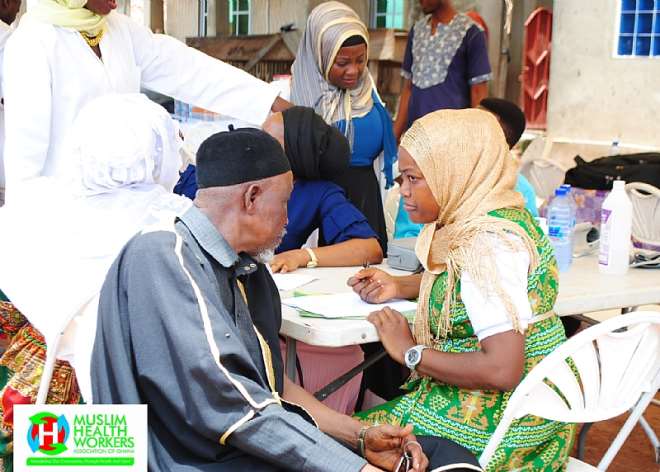
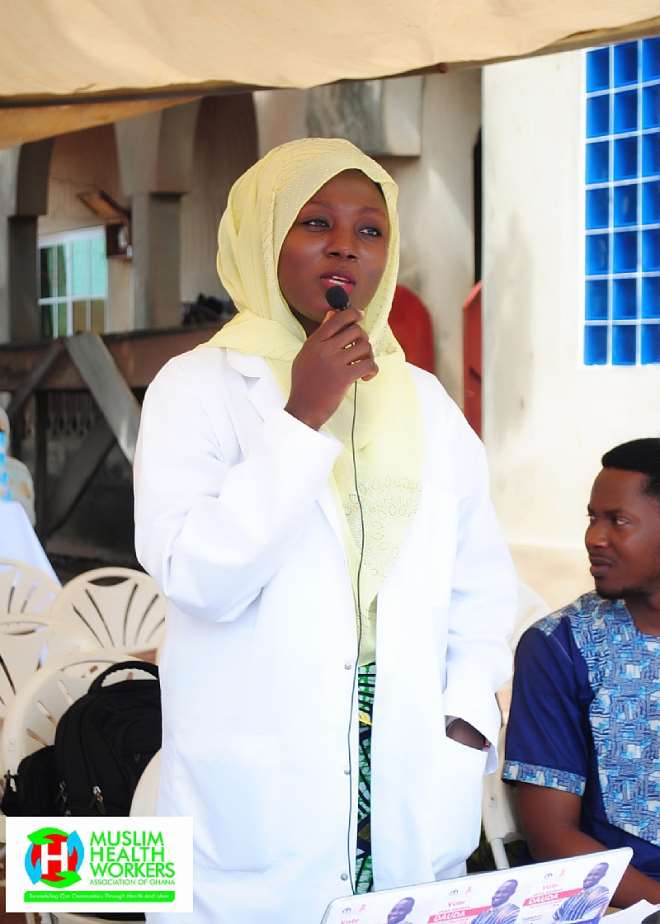
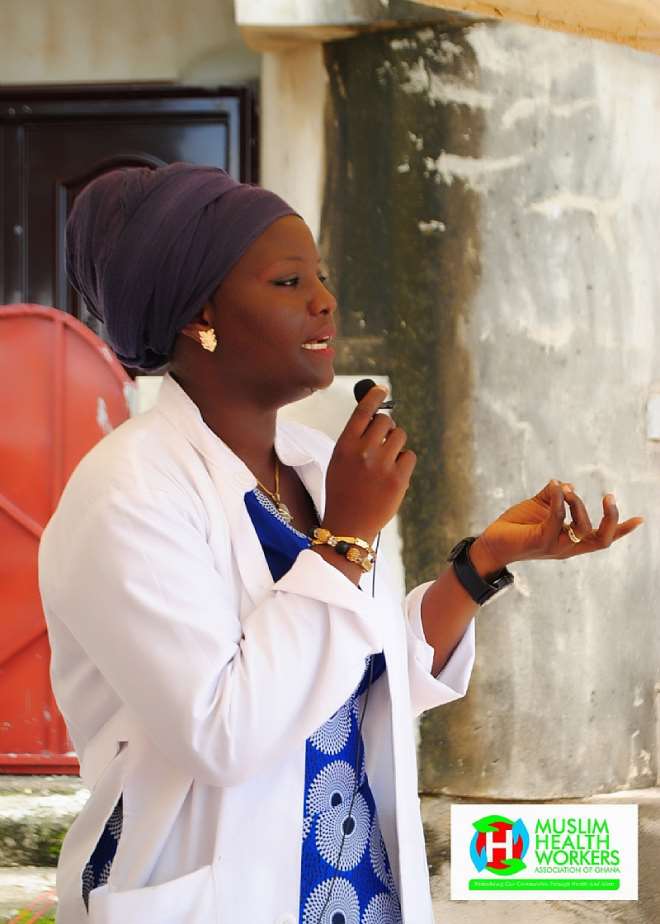

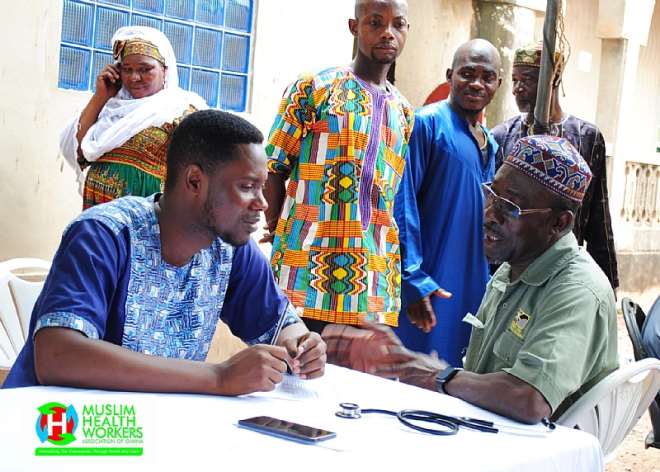
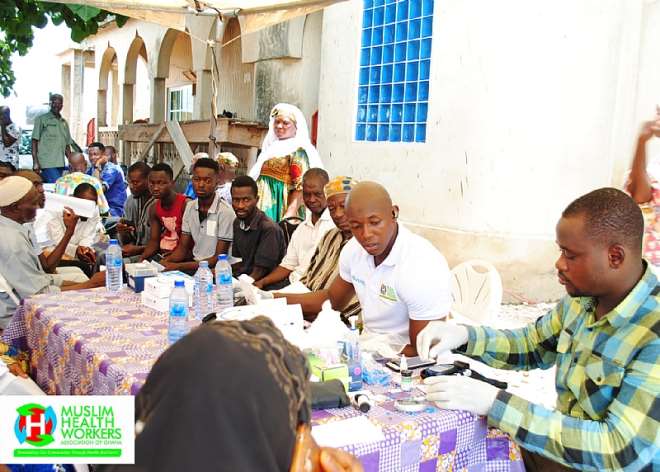
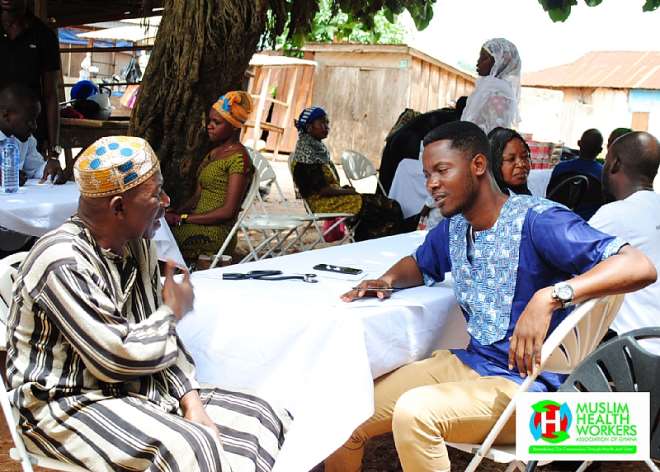
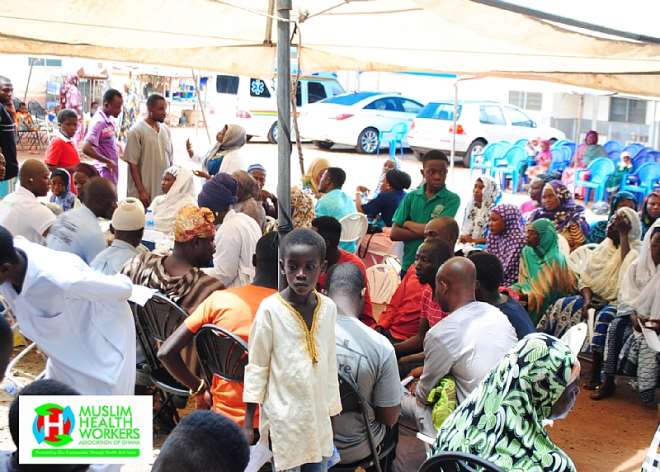
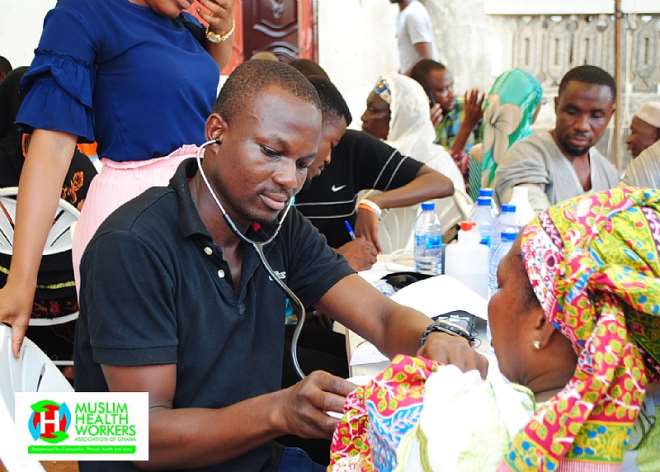





 SSNIT must be managed without gov’t interference – Austin Gamey
SSNIT must be managed without gov’t interference – Austin Gamey
 Ejisu by-election could go either way between NPP and independent candidate — Gl...
Ejisu by-election could go either way between NPP and independent candidate — Gl...
 We never asked ministers, DCEs to bring NPP apparatchiks for returning officer r...
We never asked ministers, DCEs to bring NPP apparatchiks for returning officer r...
 No one denigrated the commission when you appointed NDC sympathizers during your...
No one denigrated the commission when you appointed NDC sympathizers during your...
 Used cloth dealers protests over delayed Kumasi Central Market project
Used cloth dealers protests over delayed Kumasi Central Market project
 A/R: Kwadaso onion market traders refuse to relocate to new site
A/R: Kwadaso onion market traders refuse to relocate to new site
 Dumsor: Corn mill operators at Kaneshie market face financial crisis
Dumsor: Corn mill operators at Kaneshie market face financial crisis
 Jamestown fishermen seek support over destruction of canoes by Tuesday's heavy d...
Jamestown fishermen seek support over destruction of canoes by Tuesday's heavy d...
 Election 2024: EC to commence voter registration exercise on May 7
Election 2024: EC to commence voter registration exercise on May 7
 Western Region: GWL hopeful of restoration of water today in Sekondi-Takoradi
Western Region: GWL hopeful of restoration of water today in Sekondi-Takoradi
